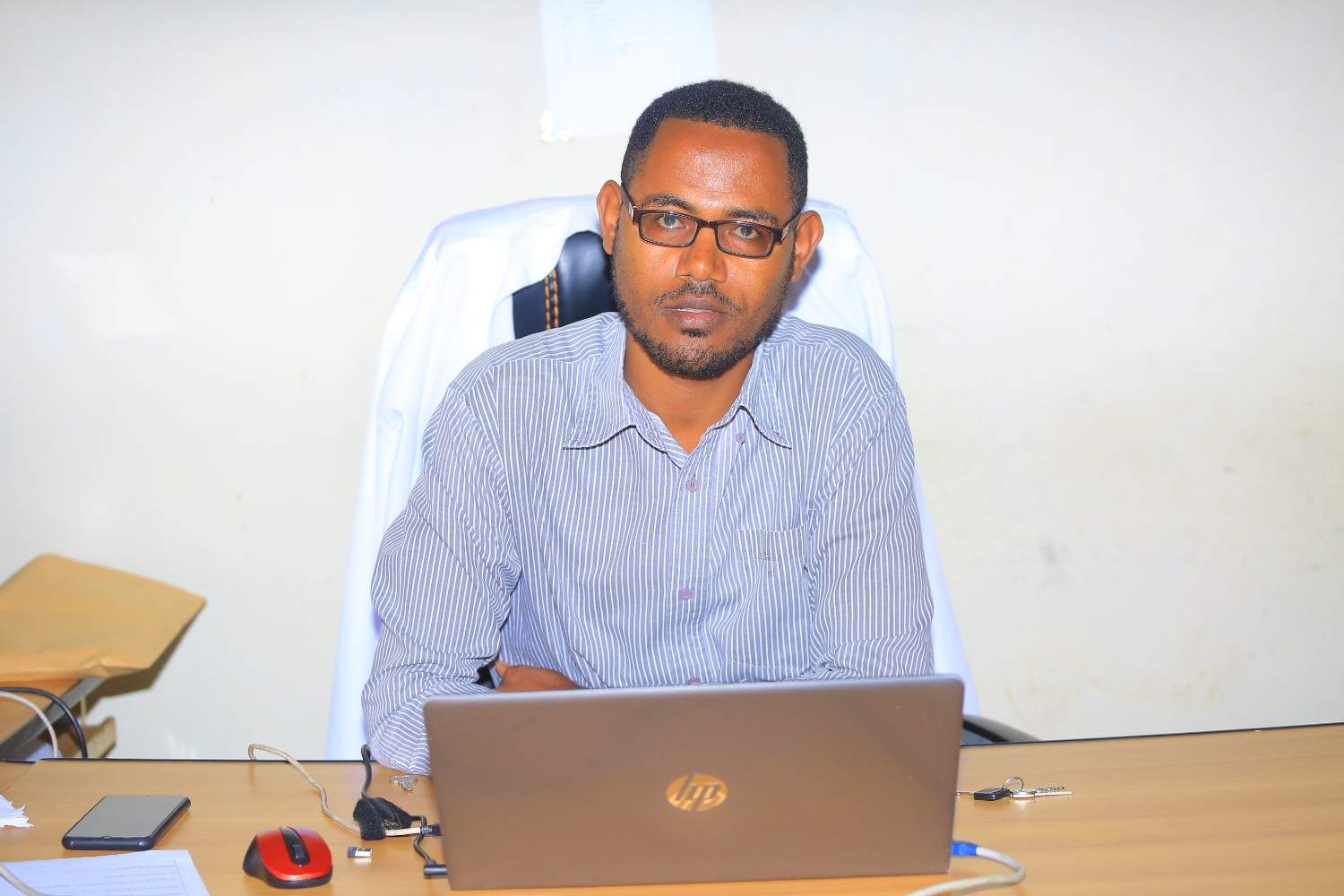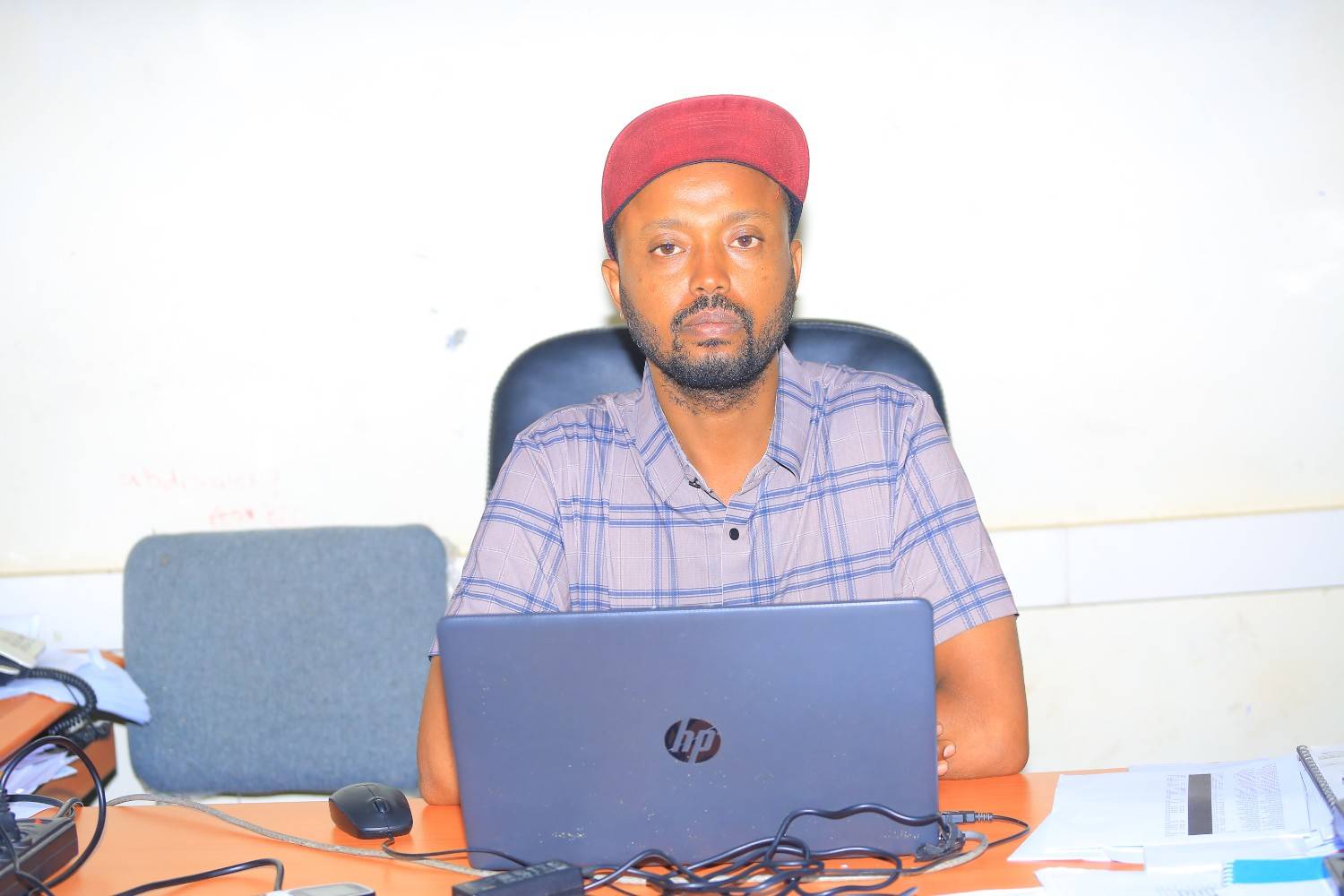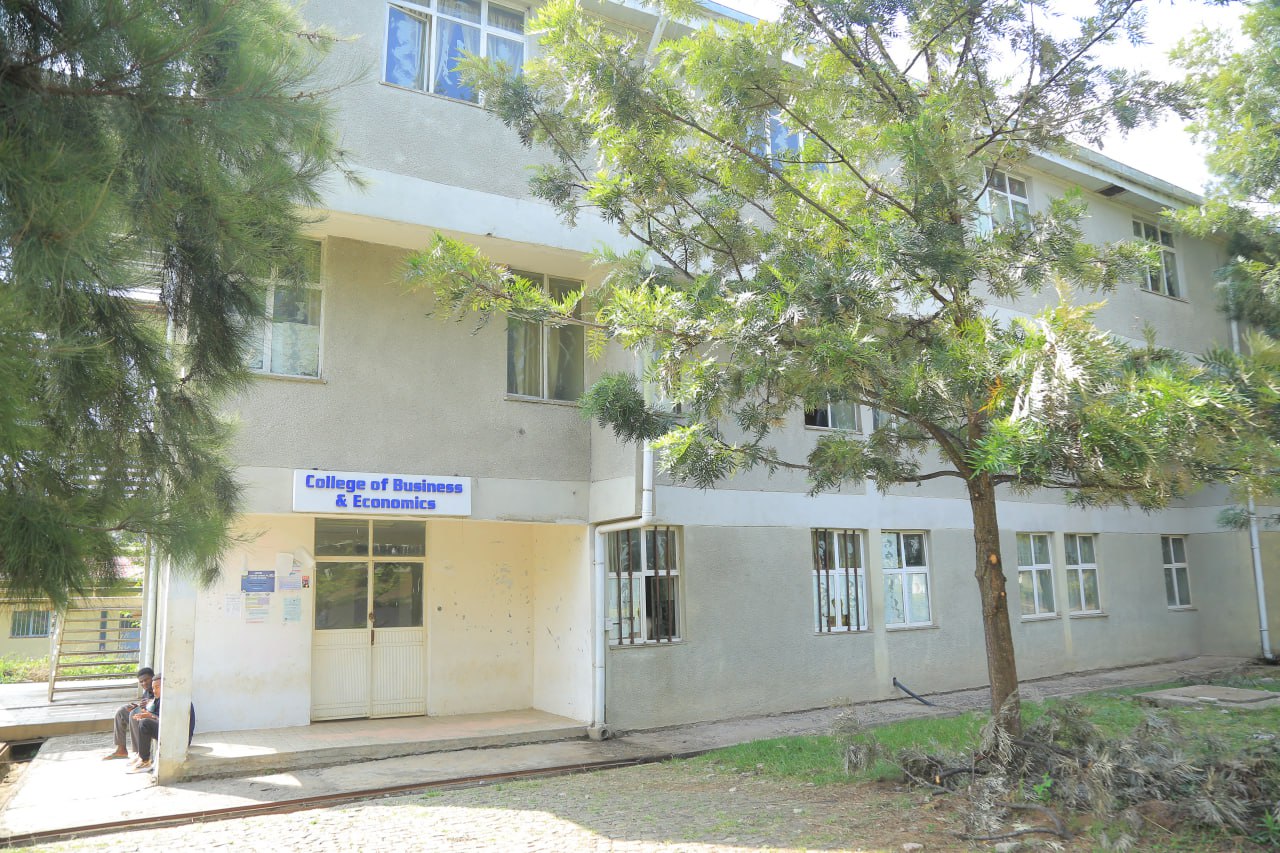College of Business and Economics

Department Head of Accounting and Finance
Mr. Berhanu Dereja Gebremichael
Contact Information:
Phone: +251923063156
Email:
Overview of the Department of Accounting and Finance
The Department of Accounting and Finance at Wolkite University is one of the core academic units within the College of Business and Economics. It is committed to providing quality education, research, and community engagement in the fields of accounting, auditing, financial management, and related disciplines. The department plays a crucial role in preparing students with the knowledge, skills, and ethical standards necessary to meet the growing demands of the national and international financial sectors.
Established with the vision to become a center of excellence in accounting and finance education and research, the department offers undergraduate and postgraduate programs designed to develop competent professionals who can contribute effectively to the economic development of Ethiopia and beyond.
Objectives/Goals
- To deliver high-quality education in accounting and finance that meets national and global standards.
- To produce skilled and ethical professionals capable of addressing financial, auditing, and managerial challenges in both public and private sectors.
- To conduct research that contributes to the advancement of knowledge and addresses local, regional, and national financial issues.
- To promote community engagement by offering training, consultancy, and financial literacy programs to stakeholders.
- To integrate technology and innovation in the teaching, learning, and practice of accounting and finance.
- To foster partnerships and collaboration with industries, governmental organizations, and international institutions for academic and professional development.
Duties and Responsibilities
- Teaching and Learning
- Deliver undergraduate and graduate courses in accounting, auditing, taxation, financial management, and related areas.
- Develop and review curricula regularly to ensure relevance and quality.
- Provide academic advising and mentorship to students.
- Research and Publication
- Conduct individual and collaborative research on contemporary issues in accounting and finance.
- Publish research findings in reputable journals and present at conferences.
- Encourage student involvement in research and innovation.
- Community Service
- Provide financial training and consultancy services to local communities, government offices, and businesses.
- Organize seminars and workshops to enhance public awareness of financial best practices.
- Professional Development
- Engage in continuous professional development to stay updated with global trends in the field.
- Facilitate capacity-building programs for staff and stakeholders.
- Academic Administration
- Participate in departmental and university-level committees and governance activities.
- Prepare course outlines, examination materials, and academic reports.
- Ensure the implementation of quality assurance mechanisms.
- Ethical Standards and Integrity
- Promote ethical conduct, transparency, and accountability in academic and professional activities.
- Foster a culture of responsibility, diligence, and honesty among students and staff.

Department Head of Marketing Management
Mr. Ayana Belay Denek
Contact Information:
Phone: +251913586373
Email:
Overview of the Department of Management
The Department of Management at Wolkite University is one of the cornerstone academic units within the College of Business and Economics. It is dedicated to preparing future leaders, entrepreneurs, and decision-makers equipped with the managerial knowledge, ethical values, and strategic thinking required to thrive in today’s dynamic business environment.
Established to support Ethiopia’s growing need for effective management professionals across both public and private sectors, the department focuses on delivering a well-rounded education that integrates theory with practical application. The curriculum emphasizes core areas such as organizational behavior, strategic management, human resource management, operations, marketing, and entrepreneurship.
I. Objectives/Goals
The primary goals of the Head of the Department of Management are:
- Ensure Academic Excellence: To provide strong leadership in delivering quality education that develops competent, ethical, and globally aware graduates in management.
- Curriculum Development and Modernization: To ensure that the department’s curriculum remains relevant, innovative, and aligned with the dynamic needs of the local and international labor markets.
- Promote Research and Knowledge Generation: To foster a vibrant research environment that addresses contemporary management challenges and contributes to sustainable development.
- Enhance Employability and Entrepreneurial Capacity: To prepare students with practical skills, leadership qualities, and an entrepreneurial mindset to succeed in various sectors.
- Strengthen Institutional Capacity: To develop the academic and professional capacity of departmental staff and ensure efficient use of resources.
- Foster Industry and Community Engagement: To promote partnerships with public institutions, private sector, and communities for collaborative learning, consultancy, and outreach activities.
- Ensure Quality Assurance and Good Governance: To maintain high academic standards and ensure compliance with national higher education policies and the strategic goals of Wolkite University.
II. Duties and Responsibilities
A. Academic Leadership
- Lead the design, implementation, review, and continuous improvement of Management programs.
- Promote student-centered teaching and the use of case studies, real-life projects, and experiential learning.
- Ensure curriculum integration of contemporary themes such as leadership, change management, sustainability, and digital transformation.
B. Administrative and Operational Management
- Prepare and manage the department’s annual plan, budget, and periodic activity reports.
- Oversee scheduling of classes, allocation of teaching loads, and exam coordination.
- Ensure proper documentation, communication, and record-keeping within the department.
C. Staff Development and Supervision
- Assign academic and administrative responsibilities equitably based on staff qualifications and university policies.
- Support faculty in pursuing postgraduate training, research, and professional growth.
- Monitor and evaluate staff performance and recommend rewards, development plans, or corrective actions.
D. Research and Scholarly Activities
- Encourage staff and students to engage in applied research related to business, development, and organizational effectiveness.
- Facilitate research grant applications, publications, and participation in academic forums.
- Organize departmental research workshops, seminars, and knowledge-sharing platforms.
E. Student Support and Academic Services
- Ensure quality academic advising, mentorship, and career guidance services for students.
- Monitor student academic performance, address grievances, and support initiatives to reduce dropout rates.
- Promote student involvement in leadership, innovation, and community-based projects.
F. Community and Industry Linkages
- Develop strategic partnerships with government bodies, private firms, and NGOs for student internships, consultancy, and collaborative projects.
- Lead the department in delivering community service and business outreach programs.
- Involve external stakeholders in curriculum review, student assessment, and quality improvement.
G. Quality Assurance and Accreditation
- Implement internal quality assurance mechanisms as per HERQA and university frameworks.
- Prepare the department for external academic audits, reviews, and accreditations.
- Monitor performance indicators such as student outcomes, staff output, and resource utilization.
H. Strategic and Institutional Participation
- Represent the department in academic commissions, university senate, and relevant committees.
- Align departmental strategies with the broader vision and mission of Wolkite University.
- Contribute to institutional initiatives, policy development, and strategic planning.

Head Department of Management
Mr. Samuel Gemechu Gonfa
Contact Information:
Phone: +251910316571
Email:
Overview of the Department of Management
The Department of Management at Wolkite University is one of the cornerstone academic units within the College of Business and Economics. It is dedicated to preparing future leaders, entrepreneurs, and decision-makers equipped with the managerial knowledge, ethical values, and strategic thinking required to thrive in today’s dynamic business environment.
Established to support Ethiopia’s growing need for effective management professionals across both public and private sectors, the department focuses on delivering a well-rounded education that integrates theory with practical application. The curriculum emphasizes core areas such as organizational behavior, strategic management, human resource management, operations, marketing, and entrepreneurship.
I. Objectives/Goals
The primary goals of the Head of the Department of Management are:
- Ensure Academic Excellence: To provide strong leadership in delivering quality education that develops competent, ethical, and globally aware graduates in management.
- Curriculum Development and Modernization: To ensure that the department’s curriculum remains relevant, innovative, and aligned with the dynamic needs of the local and international labor markets.
- Promote Research and Knowledge Generation: To foster a vibrant research environment that addresses contemporary management challenges and contributes to sustainable development.
- Enhance Employability and Entrepreneurial Capacity: To prepare students with practical skills, leadership qualities, and an entrepreneurial mindset to succeed in various sectors.
- Strengthen Institutional Capacity: To develop the academic and professional capacity of departmental staff and ensure efficient use of resources.
- Foster Industry and Community Engagement: To promote partnerships with public institutions, private sector, and communities for collaborative learning, consultancy, and outreach activities.
- Ensure Quality Assurance and Good Governance: To maintain high academic standards and ensure compliance with national higher education policies and the strategic goals of Wolkite University.
II. Duties and Responsibilities
A. Academic Leadership
- Lead the design, implementation, review, and continuous improvement of Management programs.
- Promote student-centered teaching and the use of case studies, real-life projects, and experiential learning.
- Ensure curriculum integration of contemporary themes such as leadership, change management, sustainability, and digital transformation.
B. Administrative and Operational Management
- Prepare and manage the department’s annual plan, budget, and periodic activity reports.
- Oversee scheduling of classes, allocation of teaching loads, and exam coordination.
- Ensure proper documentation, communication, and record-keeping within the department.
C. Staff Development and Supervision
- Assign academic and administrative responsibilities equitably based on staff qualifications and university policies.
- Support faculty in pursuing postgraduate training, research, and professional growth.
- Monitor and evaluate staff performance and recommend rewards, development plans, or corrective actions.
D. Research and Scholarly Activities
- Encourage staff and students to engage in applied research related to business, development, and organizational effectiveness.
- Facilitate research grant applications, publications, and participation in academic forums.
- Organize departmental research workshops, seminars, and knowledge-sharing platforms.
E. Student Support and Academic Services
- Ensure quality academic advising, mentorship, and career guidance services for students.
- Monitor student academic performance, address grievances, and support initiatives to reduce dropout rates.
- Promote student involvement in leadership, innovation, and community-based projects.
F. Community and Industry Linkages
- Develop strategic partnerships with government bodies, private firms, and NGOs for student internships, consultancy, and collaborative projects.
- Lead the department in delivering community service and business outreach programs.
- Involve external stakeholders in curriculum review, student assessment, and quality improvement.
G. Quality Assurance and Accreditation
- Implement internal quality assurance mechanisms as per HERQA and university frameworks.
- Prepare the department for external academic audits, reviews, and accreditations.
- Monitor performance indicators such as student outcomes, staff output, and resource utilization.
H. Strategic and Institutional Participation
- Represent the department in academic commissions, university senate, and relevant committees.
- Align departmental strategies with the broader vision and mission of Wolkite University.
- Contribute to institutional initiatives, policy development, and strategic planning.

Head of the Department of Economics
Mr. Bisrat Getinet Chane
Contact Information:
Phone: +251910850688
Email:
Overview of the Department of Economics
The Department of Economics at Wolkite University is a vital academic unit within the College of Business and Economics, committed to advancing economic knowledge, policy analysis, and sustainable development. Established with the aim of producing highly skilled economists equipped to address Ethiopia's complex socio-economic challenges, the department offers rigorous academic programs, research opportunities, and community engagement initiatives.
Rooted in the university’s mission of academic excellence and public service, the department provides a dynamic learning environment where students gain a strong foundation in economic theory, quantitative analysis, and real-world policy applications. The curriculum is designed to blend theoretical insight with practical skills, enabling graduates to analyze economic trends, formulate policy solutions, and contribute to national and regional development agendas.
The Department of Economics plays a critical role in:
ü Educating future economists who are ethically grounded, analytically competent, and socially responsible.
ü Conducting applied research on pressing economic issues such as poverty, unemployment, inflation, trade, and rural development.
ü Engaging with communities and policy makers to inform development planning and promote inclusive economic growth.
Objectives/Goals
- Promote Academic Excellence: To provide strategic leadership in delivering high-quality economics education and fostering academic excellence in teaching, learning, and research.
- Ensure Curriculum Relevance and Innovation: To develop and maintain a modern, relevant curriculum that addresses current economic issues, national development goals, and global economic trends.
- Advance Research and Policy Engagement: To promote policy-relevant research that contributes to national economic development and informs public decision-making.
- Build Staff and Institutional Capacity: To enhance the qualifications, skills, and academic productivity of faculty members and build the department's institutional capacity.
- Strengthen Student Support and Employability: To equip students with theoretical knowledge, analytical skills, and practical tools needed for careers in economics, public policy, and development sectors.
- Foster Community and Industry Linkages: To engage with government, private sector, and civil society in collaborative research, community outreach, and policy dialogue.
Responsibilities of the Head of the Department of Economics
A. Academic and Curriculum Management
- Lead the design, delivery, and continuous review of undergraduate and postgraduate economics programs.
- Ensure the curriculum reflects local, national, and global economic challenges and development priorities.
- Promote the use of participatory, practical, and technology-supported teaching methods.
B. Administrative and Operational Leadership
- Coordinate the preparation and implementation of the department’s strategic and annual plans.
- Oversee the management of departmental resources, including budget, facilities, and academic records.
- Manage staff assignments, class scheduling, and exam coordination.
C. Faculty Supervision and Development
- Allocate teaching and administrative tasks fairly based on qualifications and workload policy.
- Support faculty members in pursuing postgraduate studies, research activities, and professional development.
- Conduct performance evaluations and make recommendations for promotion, training, or corrective actions.
D. Research and Publication
- Promote a strong research culture focused on economic policy, development, agriculture, labor markets, and related fields.
- Encourage the publication of research findings in national and international journals.
- Facilitate seminars, workshops, and collaborative projects that foster research output.
E. Student Guidance and Development
- Organize academic advising, mentorship, and career guidance programs for economics students.
- Monitor students’ academic performance and address grievances and disciplinary issues.
- Promote student participation in conferences, policy dialogues, and community-based economic research.
F. Community Engagement and Policy Advocacy
- Initiate and coordinate community service projects that apply economic principles to solve real-life problems.
- Collaborate with government and development organizations on policy research, training, and consultancy services.
- Facilitate public lectures, panel discussions, and research dissemination events.
G. Quality Assurance and Reporting
- Ensure the department meets academic standards set by the university and HERQA.
- Prepare and submit timely reports on departmental performance, student outcomes, and staff contributions.
- Lead the department in internal and external reviews and contribute to university-wide quality assurance initiatives.
H. Institutional Representation and Strategic Contribution
- Represent the department in university academic commissions, councils, and external meetings.
- Participate in university planning and policy formulation efforts.
- Align departmental goals with the vision and mission of Wolkite University as a development-focused institution.

Berhanu Tereda Mengesha
Contact Information:
Phone: +251980497145
Email:
Objectives/Goals
- Academic Excellence: Promote high-quality teaching, learning, and research in business and economics.
- Faculty Development: Recruit, support, and retain top-tier faculty across all business disciplines.
- Student Success: Enhance student engagement, career readiness, and entrepreneurial skills.
- Industry and Community Engagement: Strengthen relationships with businesses, government agencies, and financial institutions.
- Research and Innovation: Support faculty and student research on economic policies, business trends, and market dynamics.
- Curriculum Enhancement: Ensure programs align with industry needs and global business trends.
- Resource Management: Oversee budgeting, fundraising, and financial sustainability of the college.
- Ethical and Sustainable Business Practices: Promote corporate social responsibility, ethics, and sustainable business models.
- Globalization and Collaboration: Develop international partnerships and exchange programs.
- Strategic Growth: Align faculty objectives with Wolkite University’s long-term vision and national economic priorities.
Duties and Responsibilities
- Leadership & Coordination:
@ Direct and oversee the activities of all departments and units within the College/School.
@ Ensure smooth collaboration among different academic and administrative units.
- Academic Excellence:
@ Develop and implement programs that enhance academic quality and standards.
@ Foster an environment that promotes innovation, research, and excellence in teaching.
- Staff & Student Welfare:
@ Plan and implement initiatives that support the well-being of faculty, staff, and students.
@ Create a conducive learning and working environment.
- Faculty Development & Recruitment:
@ Facilitate joint appointments of academic staff from external institutions and industries as per university regulations.
@ Recruit qualified professionals on a full-time or part-time basis to support research and teaching.
- Research & Development:
@ Oversee and coordinate all research activities within the College.
@ Encourage and support faculty research initiatives and collaborations.
- Continuing Education & Professional Development:
@ Organize and manage continuing education programs, including professional development courses, seminars, and workshops.
@ Promote lifelong learning opportunities for students and professionals.
- Admissions & Student Placement:
@ Develop and oversee criteria for student admissions at both the College and departmental levels.
@ Participate in student placement processes to ensure academic success.
- Resource Management:
@ Administer and oversee the effective utilization of the College’s physical and financial resources.
@ Ensure facilities and equipment are adequately maintained and used efficiently.
- Policy Implementation & Governance:
@ Establish rules and procedures for the proper administration of the College.
@ Ensure alignment with the broader policies and regulations of the University.
By effectively fulfilling these responsibilities, the College aims to maintain high academic standards, foster research excellence, and provide a supportive environment for students and faculty.
HISTORICAL BACKGROUND
The College of Business and Economics began its academic journey in 2013 G.C. with three departments: Accounting and Finance, Economics, and Management. At its inception, the College had 21 academic staff members and enrolled 140 students.
Over the years, the College has made a significant impact by producing graduates who have excelled in their fields, contributing to the country's development.
Currently, the College has expanded to four academic departments, offering:
- Four undergraduate programs with a total enrollment of 1,096 students.
- Three postgraduate programs with 101 students, available in both regular and extension programs.
This brings the total student population to 1,197, reflecting the College’s continued growth and commitment to academic excellence.
Initially, the college offered undergraduate programs in key business disciplines, including Accounting and Finance, Economics, Management, and Marketing Management. These programs were designed to equip students with the necessary knowledge and skills to excel in various sectors of the economy.
Over the years, the College of Business and Economics has expanded its academic portfolio to include postgraduate studies, such as the Master of Business Administration (MBA) program. This expansion reflects the college's commitment to advancing higher education and research in business and economics.
Since its establishment, the College of Business and Economics has educated over 5,000 students through regular, continuing, and distance education programs at both the undergraduate and postgraduate levels.
The growing demand for education in this field indicates a strong potential for continued expansion in the future. Additionally, detailed information on academic staff and student enrollment is presented in the table below.
Table 1: Academic Staffs on Duty.
|
Department |
Economics |
Marketing Management |
Accounting & Finance |
Management |
|||||||||
|
Sex |
M |
F |
T |
M |
F |
T |
M |
F |
T |
M |
F |
T |
|
|
Educational level |
2nd Degree |
8 |
- |
8 |
5 |
2 |
7 |
9 |
2 |
11 |
11 |
3 |
14 |
|
3rd Degree |
- |
- |
- |
- |
- |
- |
4 |
0 |
4 |
4 |
- |
4 |
|
|
Total |
8 |
- |
8 |
5 |
2 |
7 |
13 |
2 |
15 |
15 |
3 |
18 |
|
|
Grand Total in College |
48 |
||||||||||||
Table 2: Acadamic Staffs on study Leave
|
Department |
Economics |
Marketing Management |
Accounting & Finance |
Management |
||||||||||
|
Sex |
M |
F |
T |
M |
F |
T |
M |
F |
T |
M |
F |
T |
||
|
Educational level |
2nd Degree |
Inland |
- |
- |
- |
- |
- |
- |
- |
- |
- |
- |
- |
- |
|
Abroad |
- |
- |
- |
- |
- |
- |
- |
- |
- |
- |
- |
- |
||
|
3rd Degree |
Inland |
1 |
- |
1 |
1 |
- |
1 |
- |
- |
- |
4 |
- |
4 |
|
|
Abroad |
3 |
1 |
4 |
- |
- |
- |
- |
- |
- |
1 |
- |
1 |
||
|
Total |
4 |
1 |
5 |
1 |
- |
1 |
- |
- |
- |
5 |
- |
5 |
||
|
Grand Total in College |
11 |
|||||||||||||
Table 3: On Duty Staffs (Administrative and Lab Technician)
|
Job Title |
Lab Technician |
Administrative |
Total |
|||||
|
Sex |
M |
F |
T |
M |
F |
T |
||
|
Educational level |
10th Grade Completed |
- |
- |
- |
- |
1 |
1 |
1 |
|
12th Grade Completed |
- |
- |
- |
- |
1 |
1 |
1 |
|
|
Diploma |
- |
- |
- |
- |
1 |
1 |
1 |
|
|
1st Degree |
1 |
1 |
2 |
3 |
2 |
5 |
7 |
|
|
2nd Degree |
- |
- |
- |
2 |
- |
2 |
2 |
|
|
Grand Total in College |
1 |
1 |
2 |
5 |
5 |
10 |
12 |
|
Table 4: Student Data (Under Graduate and Post Graduate)
|
Admission |
Regular |
Extension |
Total |
|||||
|
Sex |
M |
F |
T |
M |
F |
T |
||
|
Program |
Under Graduate |
369 |
210 |
579 |
309 |
208 |
517 |
1,096 |
|
Post Graduate |
18 |
1 |
19 |
61 |
21 |
82 |
101 |
|
|
Grand Total in College |
387 |
211 |
598 |
370 |
229 |
599 |
1,197 |
|

